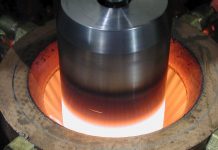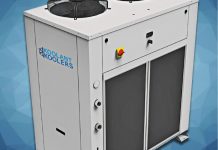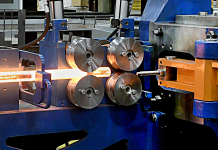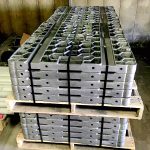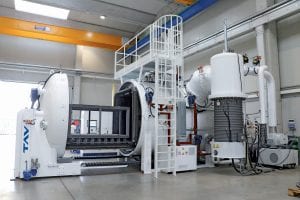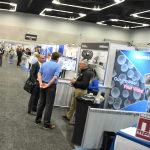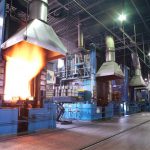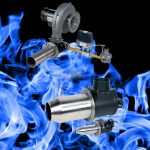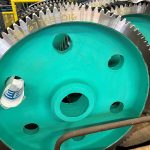The installation of an industrial heat-treating furnace is no small undertaking. From initial planning to construction and ongoing maintenance, every step is critical to ensuring the system operates at peak efficiency.
Keeping a furnace running often means coordinating with a network of different businesses, each playing a role in building and sustaining a fully operational system.
The team at VESCO takes on the challenge of folding those complex tasks into one simple go-to solution.

“Our intention as we grow is to be a true one-stop shop for the wide variety of services the heat-treat industry depends on,” said Sean Collins, service center manager for VESCO, Busch USA LLC. “Looking at vacuum-furnace maintenance, for example: the furnaces themselves. This covers everything from hot zone rebuilds, repairs, and replacements to helium leak detection, plus performing extensive ultrasonic thickness testing on pressure vessels. Through our partner company, VFE in the U.K., we’ve also been working on expanding into full control panel integrations, rebuilds, new panel builds, and installations in North America.”
New furnace installation for OEMs
VESCO is also making new furnace installs for OEMs, according to Collins. As the OEMs get busier upscaling their workforce, VESCO serves as their field service and installation partner.
“We’ve been doing this nationwide — installing new furnaces, commissioning furnaces, startups, and furnace relocations,” he said. “We’ve been doing a lot of big moves. We just moved a large number of furnaces out of the Carolinas up into Connecticut, which is basically their whole heat-treat shop of six vacuum furnaces, start to finish. That’s been a major area of growth for us. As these manufacturers expand, whether through acquisitions or new facilities, they’re consolidating equipment, and we’ve seen strong demand as a result. We service water cooling systems, and whenever we see a need in the market, we cross-train our technicians so they’re equipped to handle it. Altogether, that makes up the full suite of services we provide.”
Reliability Partners
Being able to take charge of a furnace build with optimum efficiency has a lot to do with how VESCO works with its customers, according to Collins.
“We really strive to be reliability partners with our customers because in a manufacturing environment, machine availability is everything. That means understanding the challenges faced by production, engineering, and maintenance teams,” he said. “Our goal is to be the vendor you can trust. Someone who is reliable, results-driven, and able to deliver. Reliability partnership is our philosophy. It’s not just about calling us when equipment goes down, but about preventative maintenance, design builds, and anything that helps keep operations running smoothly. We aim to not only get customers back online but also improve efficiency, shorten cycle times, and reduce pump-down times. We don’t want to just be the fire department that shows up when something’s gone wrong. We want to be a partner in long-term reliability.”
Technological advancements in the industry have been a major catalyst in VESCO’s business model, according to Collins.
“As technology has advanced, I think the demands on manufacturers have increased, specifically toward on-time delivery and delivering on budget,” he said. “A lot of these large-scale projects, or even repairs, need the multidisciplinary skills of different groups to complete any repair, whether it’s electricians, plumbers, riggers, all of that. This means having a company that’s able to bring all those resources in, under us, so that the customer has one point of contact to manage the entire project from start to finish. It’s a lot easier when you bring VESCO in because we manage the entire project. We coordinate the subcontractors, so you have one quote, one timeline, and, when the project is complete, one point of contact.”
Customer Control
This gives the customer much greater control over their project as well, according to Collins.
“They’re not a ping-pong ball getting bounced around between the different vendors,” he said. “A customer will have one group that they’re dealing with. We handle all those details for them. VESCO has the agility in this business to be able to offload a lot of that extra work and time and communication and give that time back. These people are already dealing with, let’s say down equipment, and having to retool, or move production off site. The last thing they need is to have to get into the minutia of a repair or project. That’s really how we’ve evolved — getting away from the a la carte principle, which we can do — to having an all-in-one, solution-based answer.”
Because of VESCO’s expertise in bringing multiple plans of action into one job, it’s important that Collins and his experts use a multi-step approach they use with each customer.
“That starts with our technical staff, whether it be myself, our service manager, or our technicians,” he said. “The first step is always listening, without assumptions, because there’s a lot of little details there that sometimes get left out — whether that’s past repairs or failure modes or engineering changes to the equipment that might get overlooked. After that, we really want to gather whatever available data we have, whether it’s system-specific maintenance logs and what temperatures they’re running and more to try to build out the picture of their current state, and where they want to be. At that point, we can start thinking about solutions.”

Finding the best option
Those solutions often come with a multitude of options, according to Collins.
“A lot of times there’s a choice where you have, let’s say a short-term, quick fix, if the priority is getting back online,” he said. “Then we have to get into priorities: What’s the priority here? Is it time? Is it money? That goes along the lines of the different solutions. Then we have to execute the plan that we come up with, and we have to do that by setting realistic expectations, both of price and time, and we have to be accountable to that. If we’re telling the customer that this is what we’re going to do, and this is the quoted work and timeline, we need to stick to that.”
After that, Collins emphasized one of the most important functions of VESCO: the follow-up and verification.
“Let’s make sure we’re running, and, if we can, let’s go through first article inspection; let’s make sure you’re getting good parts out of this before everybody signs up,” he said. “And that follow up is huge from us, because that’s where we’re going to learn: What worked well on this job? What didn’t work well? What should we change? What things should we keep? That’s a very important part. And I think, a lot of times, that step gets skipped. That could be keeping notes in your CMMS software and work orders so we can go back to it and see it in the future, but also for cross-training and new hire training.”
VESCO’s longevity
This complex “dance” of efficiency has helped VESCO stay viable in a constantly changing industry, according to Collins.
“Our longevity is certainly an achievement — especially nowadays,” he said. “The overarching theme here is our ability to onboard these services based on the needs of the industry. So, as we’re seeing needs change and demands change, VESCO has the ability to add these services in and train our staff to be able to service the customer with these new services.”
General field service center
The beginnings of VESCO’s longevity began in the early 1990s, when the company was a general field service center in East Windsor, Connecticut. It mainly supported large aerospace, defense, and firearms manufacturers in the area, according to Collins.
“As VESCO grew through the ’90s, they brought in some in-house engineering and were able to get into — not only the repair — but the design and building of both moly and graphite hot zones,” he said. “That meant building complete weldments and complete design builds with both the customers and the in-house engineering. That’s kind of what VESCO has always done.” In March 2023, VESCO was acquired by Busch Group to help with its metallurgical market, according to Collins.
“Busch is very big in the semiconductor, pharma, and food packaging industries, and their dry screw pump technology was a great fit for vacuum heat treating and vacuum furnaces,” he said.
Bringing manufacturing back to the U.S.
As VESCO continues to build and service furnaces across North America, Collins said that reshoring of manufacturing is going to be a major deal.
“They call it reshoring or onshoring, but it’s bringing back a lot of manufacturing that was moved out of the country,” he said. “We’re seeing that in a couple of key geographic areas where a manufacturer is coming back in. There are a lot of furnaces at very large manufacturing sites that have been mothballed for the last few years. And, as that production and manufacturing capacity comes back to the U.S., being able to expand our operations to service these folks where they are is huge.”
Due to this, VESCO is taking on a more national — and international — role, according to Collins.
“The Eastern Seaboard is very big for us,” he said. “We’ve been doing a lot of work in Texas, in the Pacific Northwest, the mid-Atlantic, and in the Michigan area. And part of that, too, is developing a workforce that’s willing to travel for weeks on end. I had two techs that were in South Dakota for almost three months doing six furnace installs for a large company there that bought furnaces out of New York and needed them set up and commissioned in South Dakota.”
Another major part of VESCO’s 10-year plan is to continue that expansion globally, according to Collins.
“We’ve already expanded into both Canada and Mexico; we’re doing a lot of work in both of those countries, and we’re really looking to expand to be a truly North American company —building those partnerships on both sides of the borders, both north and south,” he said. “Luckily, Busch has both Busch Canada and Busch Mexico counterparts that’s easing that transition for us. But they have the same needs that we have here in the U.S., as far as parts and service and engineering. That’s really where we’re looking to go as part of that expansion — to be able to service the manufacturing that seems to be coming back into the U.S.”
More info: www.vesco.com










